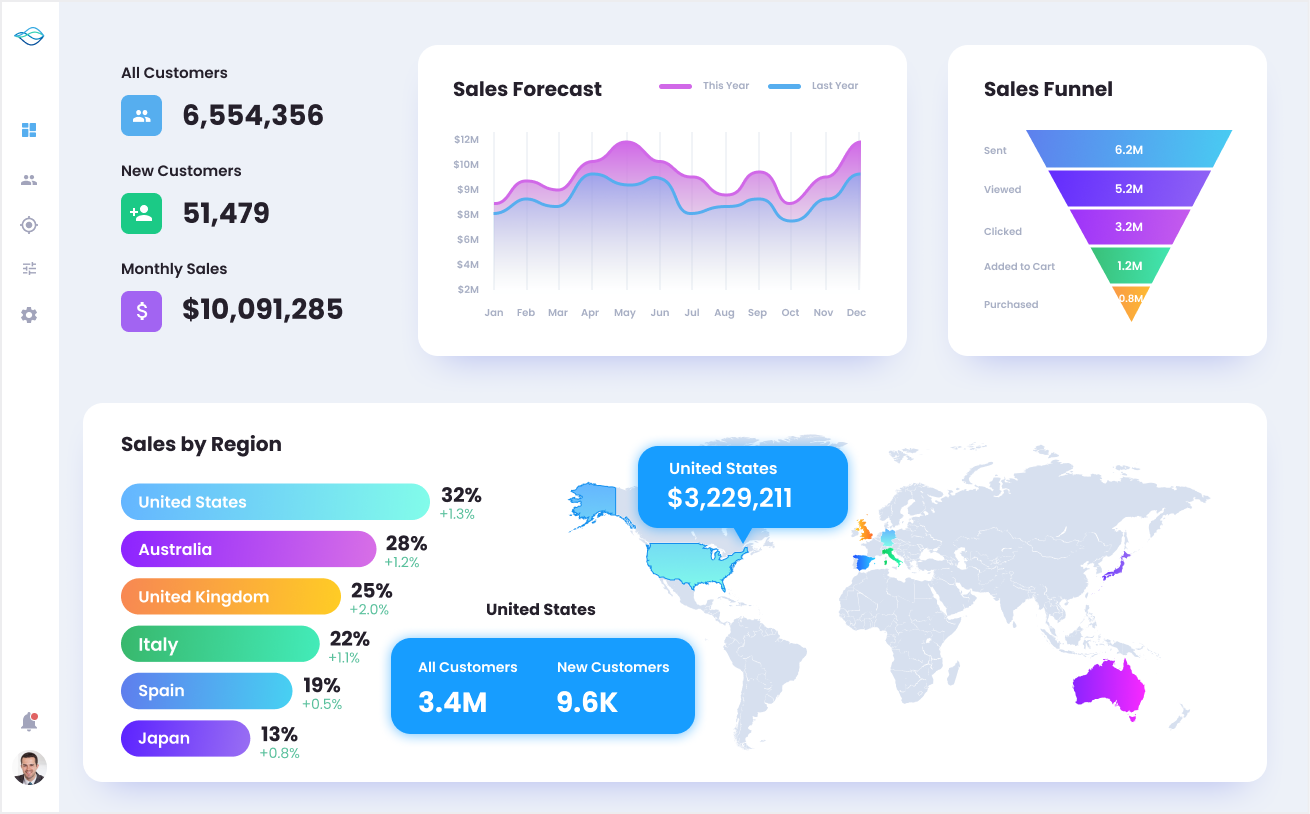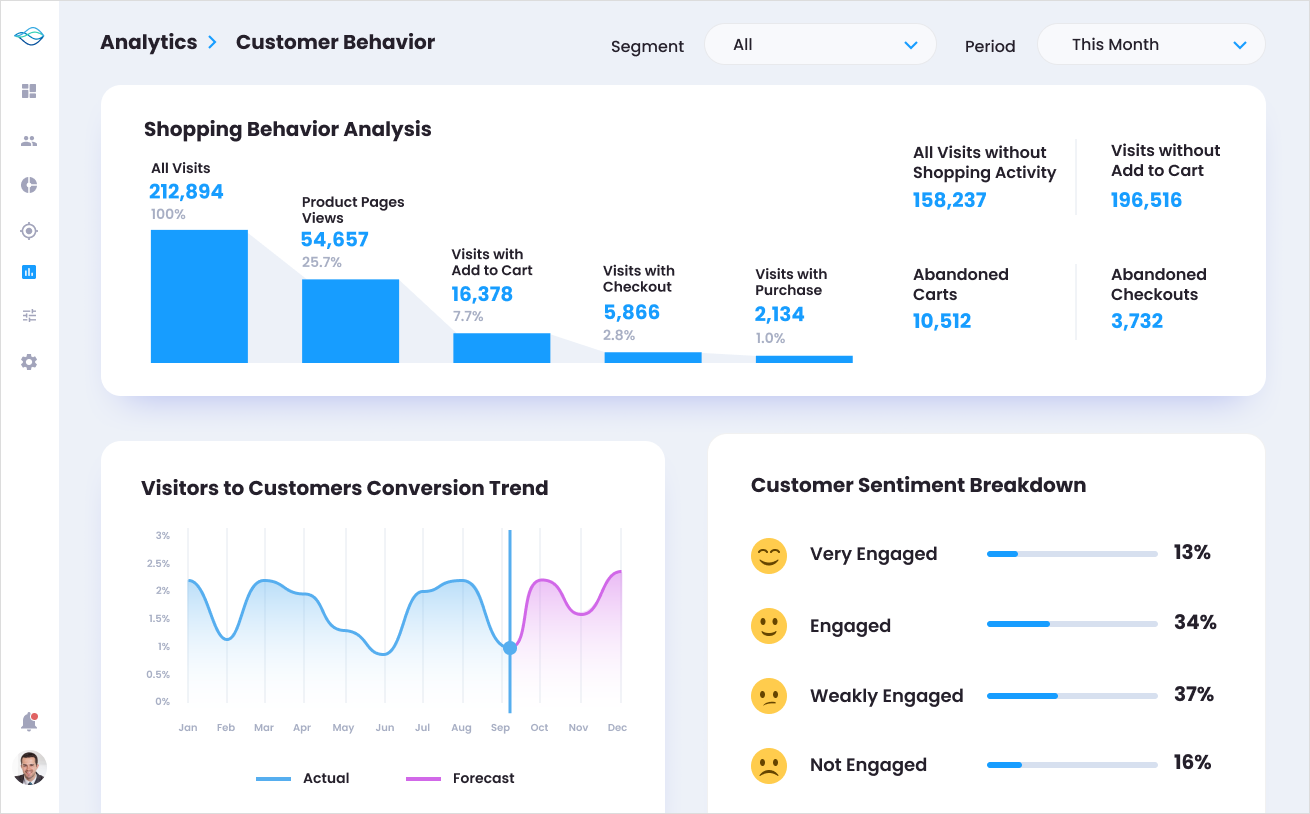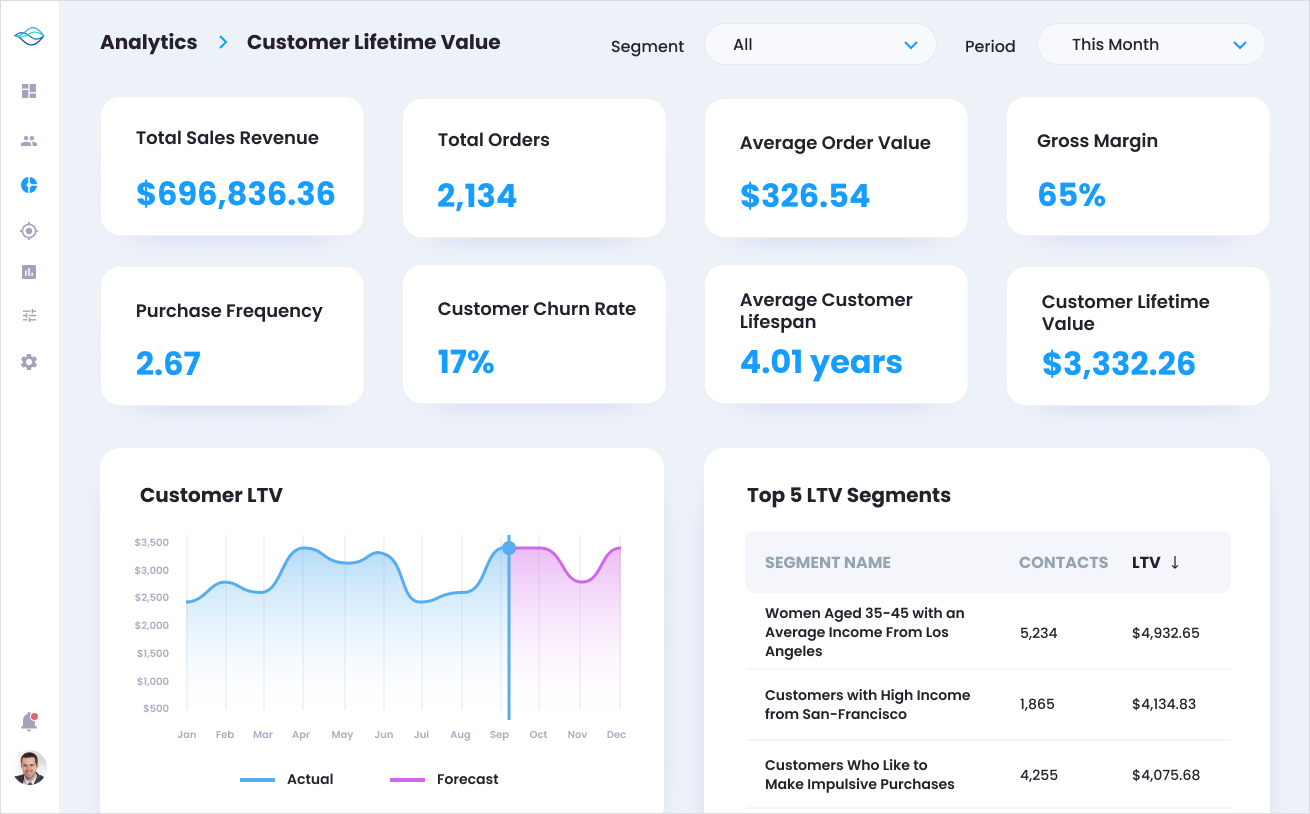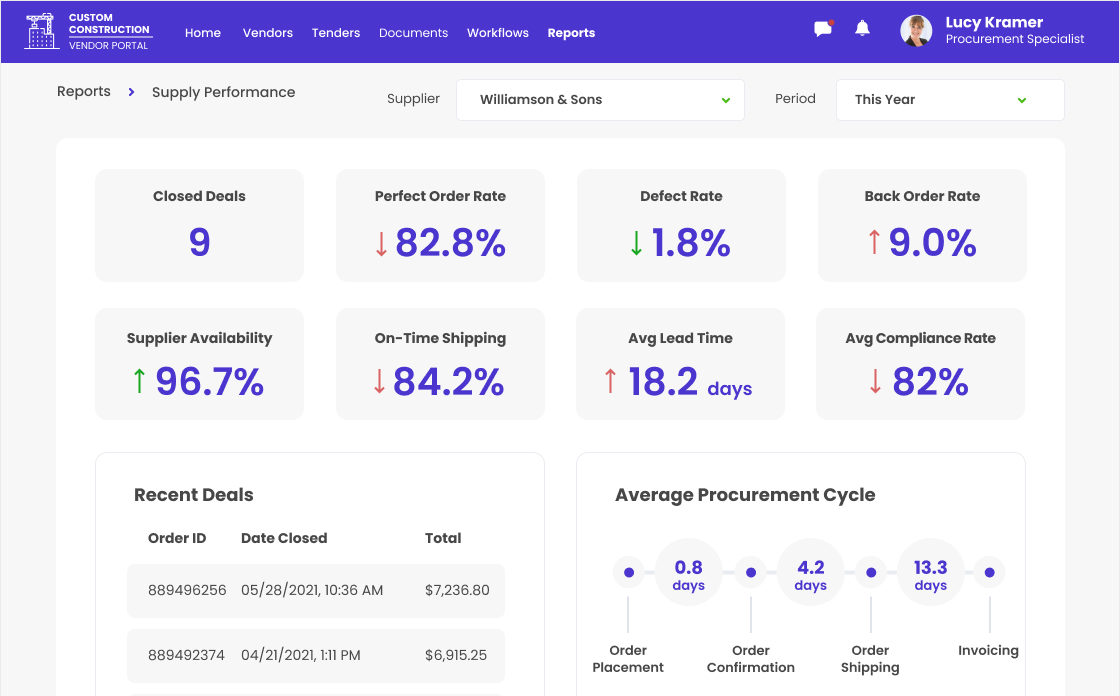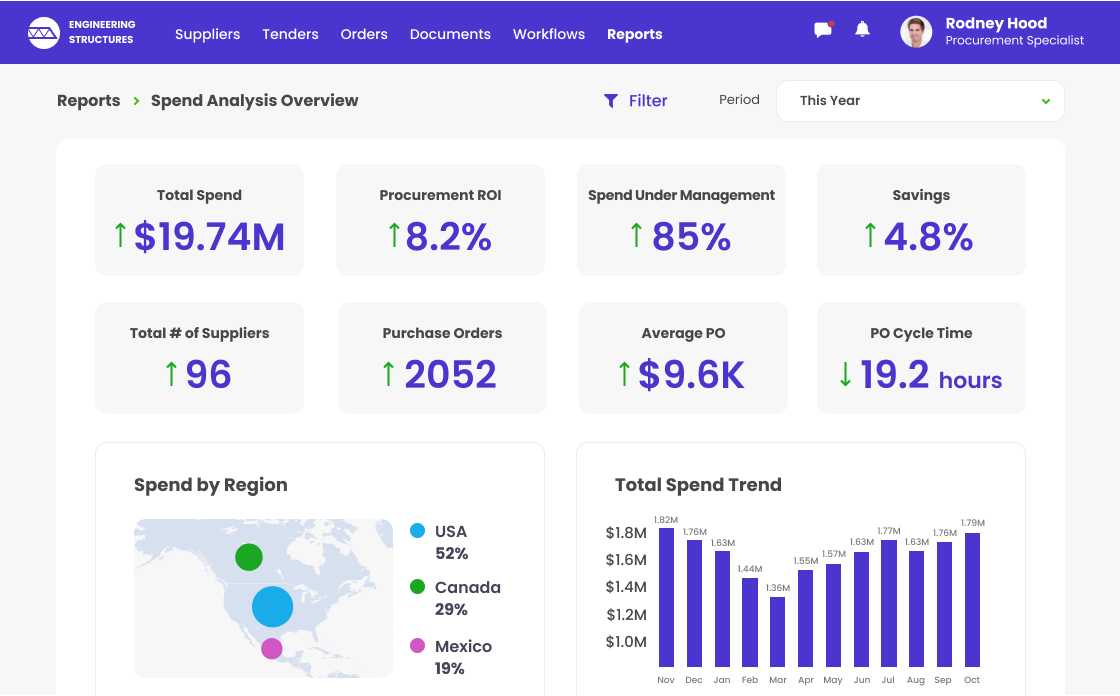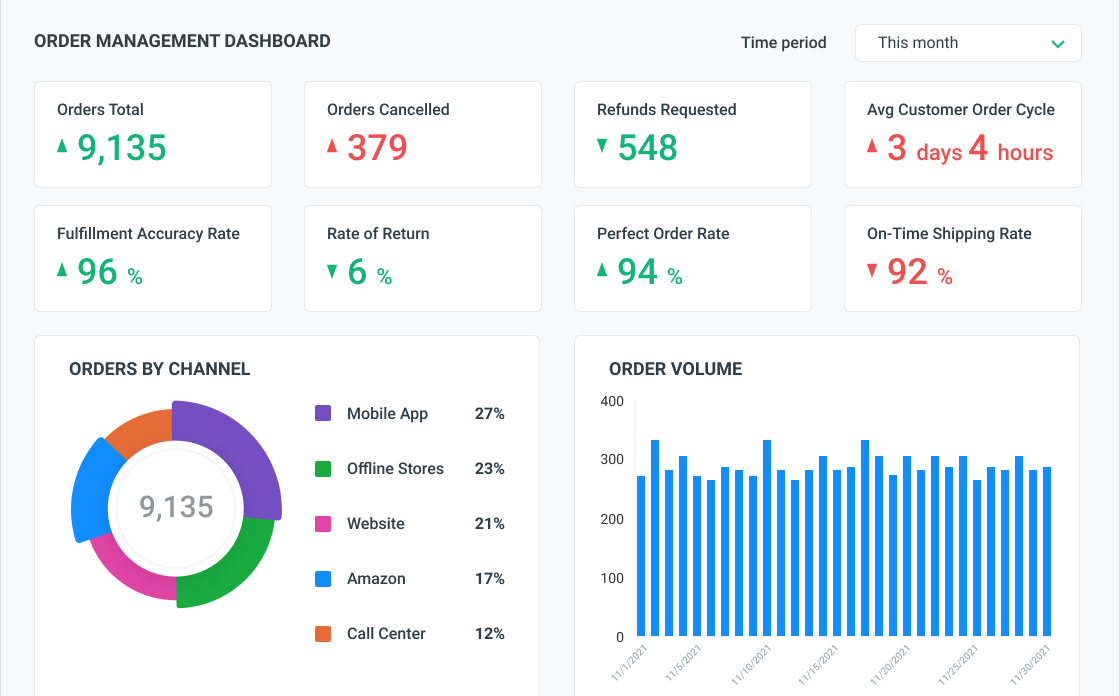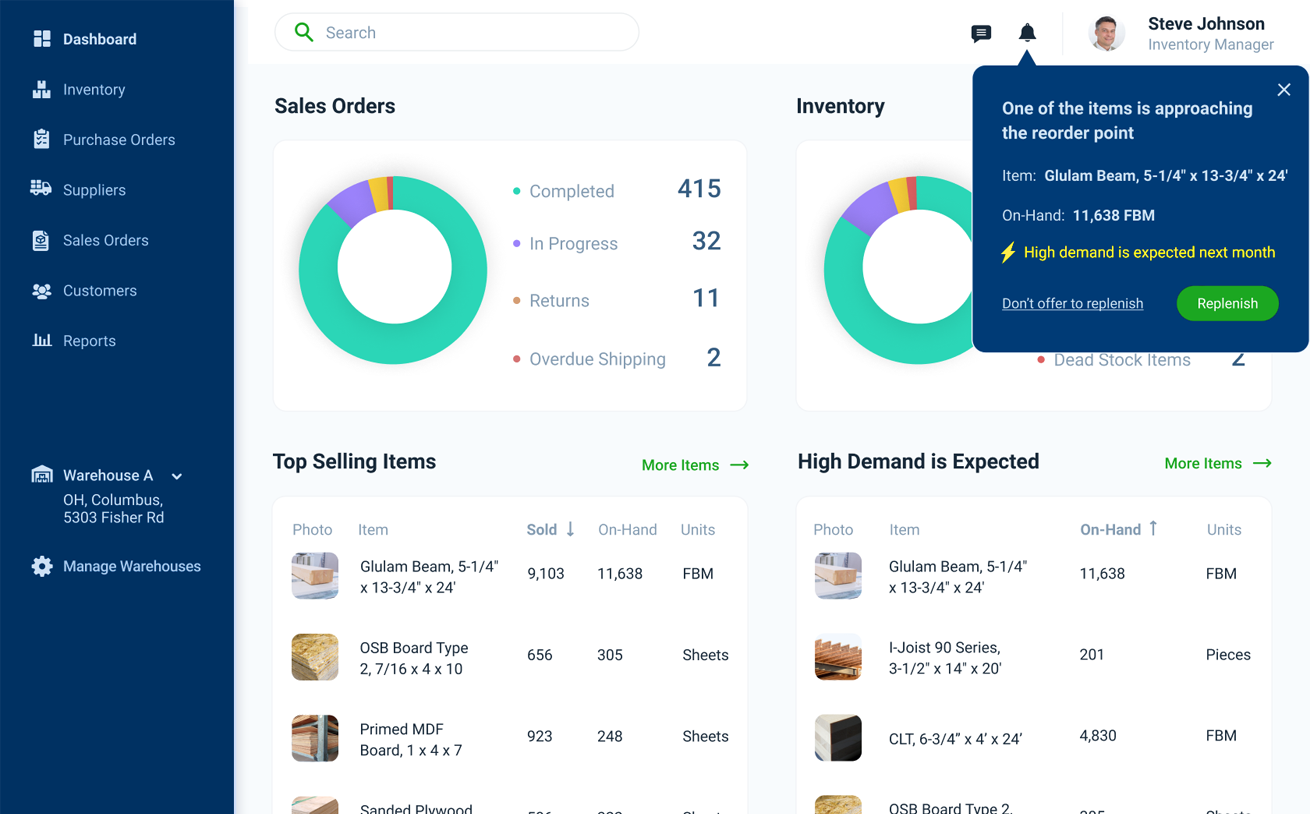Retail Business Intelligence
Key functionality, integrations, costs, benefits, and more
ScienceSoft presents an overview of features, integrations, success factors, cost components, and benefits of retail business intelligence solutions.
Retail Business Intelligence: Definition and Benefits
Retail business intelligence is needed to collect, process, and analyze retail-specific data and present analysis results in the form of easy-to-read reports and dashboards. Retail BI solutions help businesses increase customer satisfaction and improve customer retention, optimize assortment, plan marketing campaigns, identify new sales opportunities, and more.
- Implementation time: 2–6 months for an MVP.
- Implementation costs: $80,000–$1,000,000, depending on solution’s scope. Use our online calculator to get a tailored cost estimate.
- Essential integrations: CRM, an ecommerce platform, a point of sale system, customer service software, marketing campaign management software, inventory management software, supplier management software.
Retail BI Solution: Core Functionality
At ScienceSoft, we tailor retail BI solutions to the specific business processes of our clients. Here, we’ve compiled a set of solution features commonly requested by the retail organizations we work with.
Essential Integrations for Retail Business Intelligence Solutions
To understand how customers behave, how various sales channels perform and whether marketing campaigns are effective, ScienceSoft recommends taking care of essential integrations:
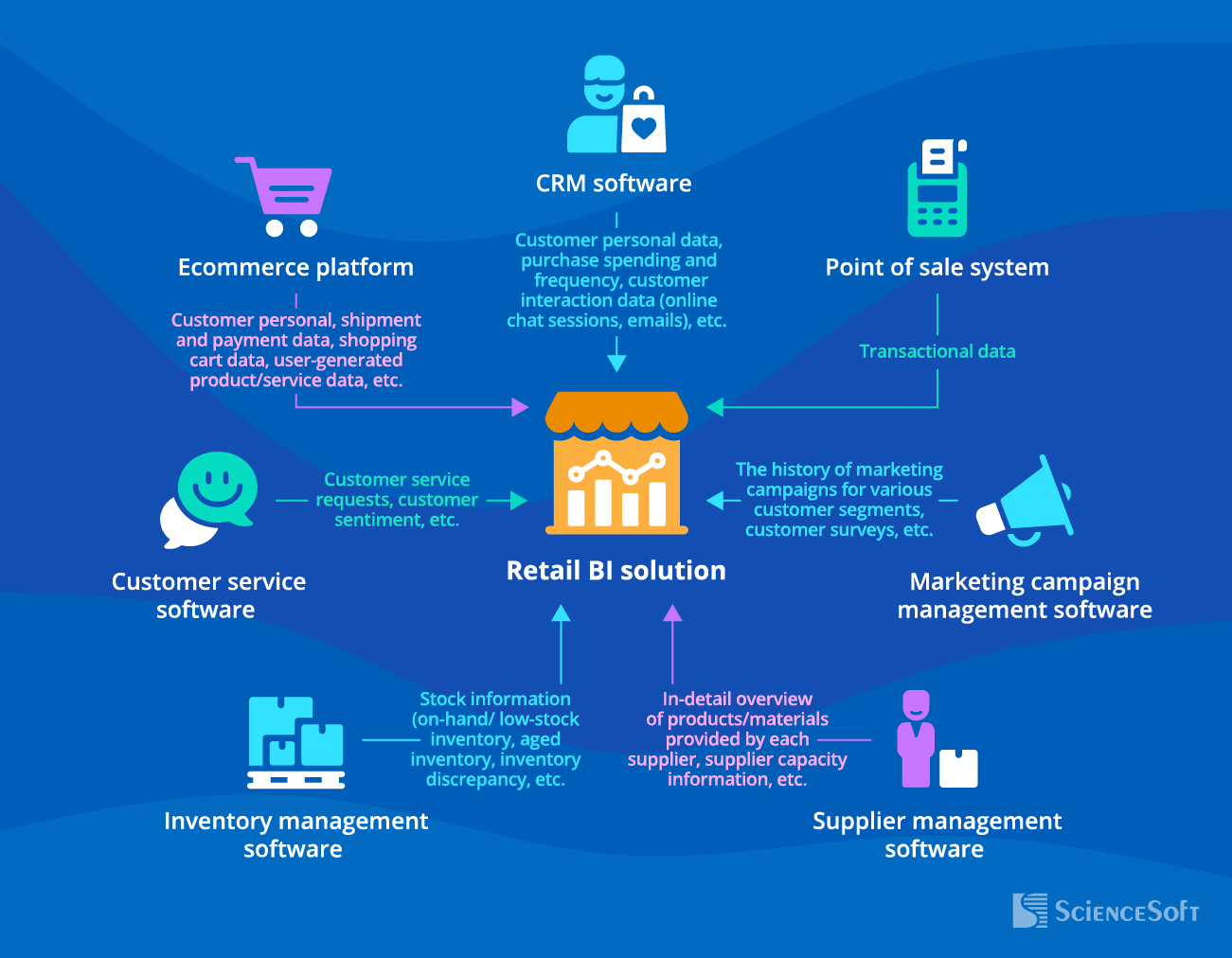
Customer relationship management (CRM) software
- To identify most valuable customers and customer segments and concentrate marketing and sales efforts accordingly.
- To analyze customer engagement, customer satisfaction, profitability, attrition, etc. across customer segments.
Ecommerce platform
Tracking metrics like the conversion rate by devices (PC/tablet/mobile), average order value, revenue and product/service preferences by customer segment, advertising channel performance, return on ad spend, etc. to:
- Analyze sales performance.
- Gain an insight into customer behavior.
- Measure the effectiveness of marketing campaigns, etc.
Point of sale system
- To track customers’ spending habits (preferred payment methods, purchase time, etc.).
- To identify popular product/service bundles.
- To measure promotion effectiveness.
- To assess store performance.
Customer service software
- To determine gaps in customer service, product assortment, etc.
- To create and optimize customer retention strategies for particular customer segments based on the analysis of customer service requests together with customer behavior.
- To analyze customer sentiment for optimized customer service, store product assortment, etc.
Marketing campaign management software
- To create marketing campaigns and optimize marketing activities (upselling and cross-selling, markdown strategies, etc.).
- To measure the success of marketing efforts.
Inventory management software
- To analyze inventory performance and maintain the optimal inventory stock levels.
- To prevent lost sales and decrease operational costs by optimizing store transfer, replenishment and inventory allocation activities.
Supplier management software
- To analyze supplier performance and conduct supplier benchmarking.
- To analyze supplier product performance (top and bottom performing products by supplier).
- To establish the cause-effect relationship between supplier performance and product cost/profitability/sales, etc.
Factors Defining Retail Intelligence Success
Leveraging 36 years of experience in data analytics and 22 years in retail, ScienceSoft defined key factors that influence the success of retail intelligence solutions.
Self-service analytics and reporting capabilities
Business users with different levels of tech expertise can rely on drag-and-drop functionality, natural language querying support, and highly customizable dashboards to access data independently and support their decision-making.
A set of data source connectors and easy-to-use APIs
To allow for seamless integration with the existing IT infrastructure and reduced development costs in case of the addition of new data sources.
Automated data management processes
To improve decision-making by reducing the time consumed for retail data ingestion, aggregation, and analysis and eliminating error-prone manual data management activities.
To secure highly sensitive customer and financial data, meet regulatory compliance requirements (e.g., GDPR) and enable secure data access and sharing across different employee levels with fine-grained access control, multifactor authentication, dynamic data masking and anonymization, end-to-end data encryption, etc.
Costs and Benefits of Retail Business Intelligence Implementation
The cost of retail business intelligence implementation can vary from $80,000 to $1,000,000+. The major cost factors include the number of integrations and their complexity, the type of data, the need for ML/AI-powered capabilities, reporting and visualization complexity.
$80,000–$200,000
A basic solution that:
- Integrates with 1 or 2 data sources, e.g., an ecommerce platform, CRM.
- Supports structured data (e.g., sales, customer demographics) and batch data processing.
- Enables rule-based analytics (e.g., providing personalized recommendations based on historical data for the same customer segment).
- Enables scheduled and ad hoc reporting.
- Features basic visualization capabilities (e.g., line, bar, and pie charts).
$200,000–$400,000
A solution of medium complexity that:
- Integrates with up to 7 data sources, e.g., inventory management and SCM software.
- Supports batch and real-time processing of all data types, including unstructured data like inventory counting images.
- Enables rule-based and ML/AI-powered analytics (e.g., providing personalized recommendations based on customer-specific behavior and preferences).
- Enables scheduled and ad hoc reporting.
- Ensures advanced visualization capabilities (e.g., heat maps to visualize sales performance from a geographical perspective, scatter plots to identify correlations between pricing and sales data).
$400,000–$1,000,000
An advanced solution that:
- Integrates with multiple data sources and supports analytics across several divisions of a geographically distributed business.
- Enables analytics powered by big data and ML/AI techs, e.g., insights into customer sentiment based on NLP-driven analysis of communication logs; demand forecasts based on data on historical sales, real-time competitor activity, seasonal trends.
- Enables scheduled and ad hoc reporting.
- Features advanced visualization capabilities.
Use our free calculator to get a ballpark cost estimate tailored to your case
Answer a few simple questions about your business needs, and our specialists will get back to you with a custom quote.
The implementation of retail business intelligence enables:
ScienceSoft’s Choice: Tools to Build a Retail Business Intelligence Solution
Below, we share the tools that we frequently use in our retail intelligence projects.
Microsoft Power BI
Best for
Retail data visualization and reporting.
Description
- 120 + native data source connectors including connectors for Azure services (Azure Synapse Analytics, Azure Cosmos DB, Azure Data Lake Storage, etc.) and third-party solutions (Google Analytics, Salesforce Reports, etc.).
- Self-service data preparation and analytics capabilities for non-tech users to run data analysis, create reports and dashboards.
- Scheduled and ad hoc reporting capabilities.
- Interactive reporting and dashboarding capabilities to drill down, drill through and filter retail data.
- Creating dashboards with out-of-the-box visuals (charts, cards, maps, matrix, etc.) and custom visuals created with the Power BI open-source visuals framework.
- Robust data security (data sensitivity labeling, end-to-end data encryption, real-time access monitoring, etc.).
- Cloud and on-premises deployment.
Pricing
- Power BI Desktop – free.
- Power BI Pro – $9.99/user/month.
- Power BI Premium –$4,995/dedicated cloud storage and compute resources/month with annual subscription.
Azure Synapse Analytics
Best for
Enterprise-scale retail data warehousing.
Description
- 90+ pre-built data sources connectors for ingesting structured, semi-structured, unstructured retail data from SQL and NoSQL databases, data lakes, operational data stores, third-party applications backed up with Azure Data factory.
- Native integration with the Azure ecosystem (Azure Data Lake Storage for data lake setup, Azure Data Factory for ETL, Azure Stream Analytics for streaming analytics, Power BI for BI and data visualization, Azure Machine Learning, Azure Cognitive Services for artificial intelligence and ML management, etc.).
- Reporting on all management levels, from the C-suite to department heads, managers and supervisors, is protected with a fine-grained data access control (granular permissions on schemas, tables, views, individual columns, procedures, other objects).
Pricing
- On-demand pricing: $1.20/hour (DW100c) - $360/hour (DW30000c).
- Reserved instance pricing can save up to 65% over the on-demand option (in a 3-year term).
- Data storage: $122.88/TB/month.

Amazon Redshift
Best for
Data warehousing for omnichannel retail analytics.
Description
- Native integration with a data lake (Amazon S3) to enable querying exabytes of structured, semi-structured, and unstructured data for analysis without loading and transformation.
- Native integration with the AWS analytics services (AWS Glue for ETL, Amazon Kinesis Data Firehose for streaming analytics, Amazon EMR for big data processing, Amazon QuickSight for BI and data visualization, Amazon SageMaker for ML management, etc.)
- Manually enabled end-to-end data encryption, granular row-level and column-level security controls.
Pricing
- On-demand pricing: $0.25 - $13.04/hour.
- Reserved instance pricing offers saving up to 75% over the on-demand option (a 3-year term).
- Data storage (RA3 node type): $0.024/GB/month.
Note: No charge for the amount of data processed.
Consider Professional Services for Retail BI Implementation by ScienceSoft
Since 2003, ScienceSoft has helped companies from the retail industry achieve analytics transparency and set up company-wide reporting to aid their decision-making and enhance customer understanding, balance supply and demand, cut operational costs and drive sales. With an in-house PMO and established project management practices, we drive project goals regardless of time and budget constraints, as well as changing requirements.
Retail BI implementation consulting
- Retail BI needs analysis.
- Retail BI solution conceptualization, architecture design and tech stack selection.
- Retail BI implementation planning (milestones, risk management planning, optimal sourcing model, defining KPIs for measuring BI software quality, etc.).
- Business case creation, including cost estimation, time budget estimates.
Retail BI implementation
- Analysis of retail BI needs and drawing up BI software requirements.
- Conceptualization and tech selection for a retail business intelligence solution.
- Iterative retail BI solution development.
- Retail BI solution quality assurance.
- After-launch support and optimization.
About ScienceSoft
ScienceSoft is an IT consulting and software development company headquartered in McKinney, Texas. We help midsize and large companies in retail digitalize their data management and analytics processes and optimize business performance with all-around business intelligence and analytics services. Being ISO 9001 and ISO 27001 certified, ScienceSoft relies on a mature quality management system and guarantees that cooperation with us does not pose any risks to our clients’ data security.
